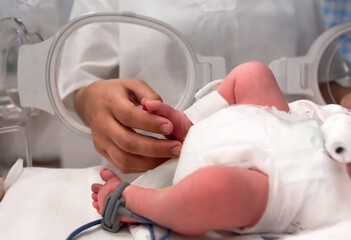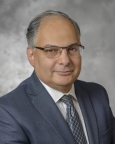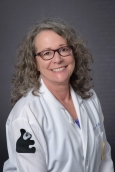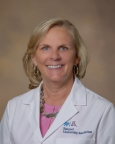Neonatology

Neonatal Intensive Care Unit (NICU)
Our approach - specialists in the Division of Neonatal-Perinatal Medicine and the Neonatal Intensive Care Unit (NICU) work together to provide a positive, family-centered care experience. We believe families should be able to ask questions of the staff in order to feel as comfortable and empowered as possible. Our team includes:
- Neonatologists
- Neonatology fellows, residents, and medical students
- Neonatal nurse practitioners and nurses
- Respiratory therapists
- Dietitians
- Lactation specialists
- Pharmacists
- Case managers
- Social workers
- Occupational and physical therapists
- Child life coordinators
Multidisciplinary Teams
An integrated approach - our team members work across disciplines and specialties to treat even the most complex maternal-fetal and newborn conditions.
Multispecialty care - our obstetric and neonatal teams include highly trained obstetrician-gynecologists, maternal-fetal medicine specialists, neonatologists, obstetric anesthesiologists, nurses and nurse practitioners, lactation counselors, social workers, geneticists and genetic counselors, ultrasound technicians, and psychiatrists and psychologists.
Top-notch infant care - our pediatric specialists and subspecialists are available during and after your newborn's hospital stay and collaborate to provide your child with exceptional care.
The Highest Level of Neonatal Intensive Care - Level IV is the highest recognition possible in newborn intensive care, providing services for even the sickest infants.
Specialties - we take pride in being at the cutting edge of new therapies for our young patients. We have special programs for the care of neonatal patients, including:
Lung rescue - newborns with life-threatening lung disorders require critical, specialized care and equipment. Our neonatal department provides the highest level of support in the region. Our faculty members have been and continue to be leaders in the development of high-tech, advanced respiratory support for newborns with respiratory failure.
Brain rescue - we are among the most experienced regional brain rescue centers. A difficult or prolonged birth process may decrease oxygen flow to the baby’s brain. In some cases, severe oxygen deprivation can lead to brain damage. Rapid but controlled brain and body cooling is sometimes able to prevent cerebral palsy, a form of brain damage. Advanced EEG capabilities also are utilized.
Cardiovascular surgery - the Division of Pediatric Cardiac Surgery is one of the largest volume pediatric cardiac programs in the state of Arizona. The division performs approximately 75 cardiac and thoracic procedures each year.
Pediatric surgery and surgical subspecialties - all neonatal surgical specialties are on-site, including general surgery, neurosurgery, otolaryngology, ophthalmology (including retina specialists), urology and a craniofacial surgery team.
Quality management - our NICU quality and patient safety teams have significantly reduced bloodstream infections associated with central lines by promoting strict guidelines for line insertion and maintenance. Other recent accomplishments include decreased rates of chronic lung disease among premies, retinopathy of prematurity, unplanned extubations and antibiotic utilization, as well as increased rates of exclusive human milk feeding. We conduct weekly unit-based safety rounds and a daily safety call to provide a venue where staff can voice their concerns and share best practices for safety. Improvement projects based on quality metrics are ongoing in the following areas:
- Placement and management of central lines
- Oxygen saturation within limits
- Reductions in unplanned extubations
- Antibiotic stewardship
- Nutrition support guidelines
- Prevention of lung injury
- Prevention of skin breakdown
- Infant-directed feeding programs
- Neonatal Abstinence Syndrome Program
Additional specialties include:
- Advanced transport systems via ground and air
- Extracorporeal membrane oxygenation (ECMO) program
- Pulmonary hypertension program
- Specialized neonatal skin and wound care
- Center for Neonatal Nutrition
Advanced Transport Systems
About us - our Pediatric and Neonatal Transport Service provides advanced ground and air transport. We are specialized and trained with the latest intensive care equipment specially adapted for newborns, infants, and children. We provide a central call-in center and a rapid team launch that includes physicians and advanced care providers. We bring our best personnel and equipment to our community so that advanced care can be started before the child’s arrival at the treatment center. We are fully integrated with ground ambulance system, which leads to efficiencies in response time and excellence in care delivery. Our high-volume service keeps us experienced in all common and rare forms of disease. We are backed up by the full spectrum of pediatric medical and surgical subspecialists to help us provide the best care immediately upon arrival at your child’s bedside.
Our team - our team includes professional dedicated pediatric and neonatal transport nurses who transport regularly, physicians, advanced care providers, respiratory therapists, and paramedics. We often send physicians and advanced care providers. Our entire team receives advanced training in ground and air transport medicine. We have extensive experience in all forms of pediatric health challenges—so we are prepared to care for even the sickest patients.
Neonatal Nutrition - nutrition is a key factor in improving the growth and overall health of premature infants and for all infants in Neonatal Intensive Care Units (NICUs). A mother's milk is especially vital, as it provides key nutrients and immune factors for the baby. To support proper nutrition, we have a designated Milk Center within our NICU that is responsible for providing information, receiving milk, preparing milk, and distributing milk to meet each infant’s individualized feeding plan. This Center maintains high-quality care in infant feeding. We employ an organized team of physicians, neonatal nutritionists, lactation specialists, oral feeding specialists, and milk nutrition technicians. This support has enabled nearly all infants in the NICU to receive human milk. Should a mother's milk supply be less than her infant’s needs, donor human milk is available if parents choose. Each day, lactation specialists review the infant’s milk needs and parents’ concerns with their supply. The neonatal nutritionists make bedside rounds with the medical team to ensure appropriate nutrition is provided to the infant to meet individualized growth needs. Growth charts are reviewed with parents and the team. The nutrition plan for after NICU discharge is also addressed and follow-up is provided when needed.
Whole-body hypothermia therapy for neonatal encephalopathy
About hypoxic-ischemic encephalopathy - hypoxic-ischemic encephalopathy (HIE) is a type of brain damage that occurs when an infant's brain doesn't receive enough oxygen and blood. HIE is a result of inadequate placental or fetal perfusion and affects approximately two out of every 1,000 live births worldwide. About 10 to 60 percent of infants with HIE will die and, of the survivors, 25 percent will exhibit significant neuro-developmental issues such as epilepsy, deafness, and motor and cognitive deficits. HIE is a dangerous condition that requires immediate medical intervention.
Hypothermia as treatment - in infants born at 36 weeks or more gestation, hypothermia initiated within six hours after birth and extending for 72 hours has been shown to significantly improve neonatal outcomes in many randomized clinical trials and has become the standard of care since 2008. Hypothermia can be accomplished by whole-body cooling using a cooling blanket or by selective head cooling. To identify the extent of brain damage, MRI is done when the infant is clinically stable, usually five to 14 days after birth.
Neonatal Abstinence Syndrome and Medically Assisted Therapy - the use of opioids and some anti-depressants during pregnancy can result in a drug withdrawal syndrome in newborns called Neonatal Abstinence Syndrome (NAS). NAS causes lengthy and costly hospital stays and lingering health problems for the newborn. NAS in babies may be easier to treat for babies whose moms get medically assisted therapy (MAT) during pregnancy. Join us as we discuss NAS and how medically assisted therapy plays a part in healthier outcomes for newborns and their mothers. The clinic comes out of the Family Centered Neonatal Abstinence Syndrome Program was established by Dr. M.Y. Bader and Lisa Grisham, neonatal nurse practitioner, to advance the care of babies born with NAS (neonatal abstinence syndrome). Babies who have been exposed to opioids and some other medications/drugs in utero often suffer withdrawal symptoms in the several days after birth. Withdrawal symptoms can include uncontrollable crying, tremors, vomiting, diarrhea, difficulties with sleep, and other autonomic disturbances.
Neonatal Abstinence Syndrome Program - Click here for more information
Point-of-Care Ultrasound
What is a point-of-care ultrasound? - point-of-care ultrasound (POC-US) refers to the use of portable ultrasonography at a patient's bedside for diagnostic and therapeutic purposes. It has been used for a long time in the field of obstetrics and gynecology. Recently, its application extended to emergency and critical care medicine, including neonatal intensive care. POC-US encompasses all organ systems and has well defined and persistently evolving indications. At the same time, it is focused, quick, and doesn’t expose patients to ionizing radiation—all great benefits. POC-US has the potential to revolutionize patient care. It is a highly valuable complement to reviewing the patient’s medical history and conducting a physical exam.
Our approach - POC-US is not as widely used as it could be mainly due to a lack of efficient and attractive training solutions, followed by the structured quality check assurance. In an effort to help bridge this gap, we have developed creative and intuitive neonatal POC-US applications, based on the most current literature. Our program is one of the first programs in the U.S. that is moving toward a structured POC-US physician training and credentialing. It’s expected to empower our neonatologists in offering the highest, cutting-edge level of care. Our ultimate goal is developing robust clinical resources that will positively impact neonatal healthcare delivery and outcomes, further setting us apart as leaders in the field of neonatal intensive care.
Specialized neonatal skin and wound care services - newborns can experience skin-related injuries as a result of medical devices, surgeries, intravenous lines, sensitive skin, and other causes. Our neonatal skin and wound service team, provide comprehensive, high-quality care to newborns with skin-related issues and injuries. Cutting-edge technology and ongoing clinical research have led to improved outcomes for our youngest, sickest, and most complex patients.
Our services - we provide comprehensive services, including:
- Wound evaluation
- Education
- Staging
- Diagnosis
- Wound debridement/management
- Dressing changes
- Pain management
- Negative pressure wound therapy
- Advanced wound care dressing therapy
Conditions we treat - we treat/manage many types of wounds and skin issues, including:
- Pressure injuries
- PIV injuries
- Dermatitis
- Skin tears
- Traumatic injuries
- Surgical wounds
- Burns
- Complex blistering injuries
Pulmonary Hypertension Program
What is pulmonary hypertension? - pulmonary hypertension is a condition in which the pressure inside the blood vessels of the lung is abnormally high. Many different conditions place a child at risk for pulmonary hypertension, including:
- Prematurity
- Chronic lung disease
- Bronchopulmonary dysplasia
- Persistent pulmonary hypertension of the newborn
- Congenital heart disease
- Congenital diaphragmatic hernia
- Interstitial lung disease
- Pulmonary hypoplasia
- Sickle cell disease
- Down syndrome
- Familial or idiopathic pulmonary arterial hypertension
Our approach to treatment - our specialists care for newborns, infants, and children with (or at risk for) pulmonary hypertension. We are dedicated to the early diagnosis of this condition and to improving the outcomes of our patients using a multidisciplinary approach to diagnosis and management. In a collaboration between our intensivist; Neonatology and Pediatrics and both pediatric cardiologists and pediatric pulmonologists who work in both inpatient and outpatient aspects of patient care, we have developed a comprehensive Pulmonary Hypertension Echocardiogram Screening Program for risk group population from neonates to teenage.
Approaches pulmonary hypertension - provide the best possible care for our patients. Ours is a multidisciplinary approach using experienced physicians and other clinical professionals who have expertise in specific areas. Your child’s care may also involve consultation with specialists at other institutions, to make sure that we bring the best collective knowledge to each case. Advance our understanding of pulmonary hypertension and develop new therapies. This serves both current and future patients: our clinical trials regularly bring new treatments to our patients sooner than would be otherwise possible.
Train new practitioners. As a program with enormous experience in treating children with pulmonary hypertension, it’s our responsibility to help train the next generation of professionals dedicated to curing this disease.
Our program members:
- Mohamed Ahmed, MD, Ph.D-Peds Neonatology
- Mary Glas Gaspers, MD-Pediatrics ICU
- Katri Typpo, MD-Pediatrics ICU
- Mike Seckeler, MD-Peds Cardiology
- Cori Daines, MD-Peds Pulmonology
Extracorporeal Life Support (ECMO)
About extracorporeal membrane oxygenation - extracorporeal membrane oxygenation (ECMO) involves using highly advanced equipment to act as a child’s temporary heart and lungs. ECMO is usually not a definitive treatment in itself; rather it’s used as a bridge to oxygenate the baby until the child can recover from their illness or doctors can perform lifesaving treatments. Conditions that might require ECMO are congenital diaphragmatic hernia, neonatal diseases which lead to pulmonary hypertension (such as meconium aspiration), and complex cardiac surgery. Sepsis and cardiac failure, which can occur during particularly bad flu seasons, can also be a rare indication for ECMO and may allow the child time to heal during the most acute phases of the illness.
Our approach to treatment - we provide extracorporeal life support for babies and children in the Tucson area. Our multidisciplinary extracorporeal life support program is run in partnership with the highly experienced NICU, PICU, and pediatric surgery teams. The pediatric surgeons are responsible for the complex surgery to get the children on ECMO, known as ECMO cannulation. We provide leading-edge ECMO services 24/7 and maintain the ability to have multiple babies on ECMO simultaneously.
Pediatric Cardiology & Cardiothoracic surgery - our cardiology subspecialty programs provide a wide array of diagnostic, medical, interventional, and surgical treatments for your child. Heart or lung surgery is scary at any age, but particularly for children, as well as their families. However, the good news is that pediatric cardiothoracic surgery is safer and more effective than ever. In fact, many young patients lead healthy, normal lives following surgery. We provide advanced heart and lung surgical procedures for infants, children, teens, and adults with congenital heart disease. Our cardiologists and cardiothoracic surgeons work together to repair our patients’ hearts collaboratively and provide the best possible care. Our programs and services include:
- Congenital heart program
- Pediatric Catheterization program
- Echocardiography program
- Fetal Cardiology Program
- Pulmonary hypertension program
- Pediatric Arrhythmia services
- Pediatric Preventive cardiology program








